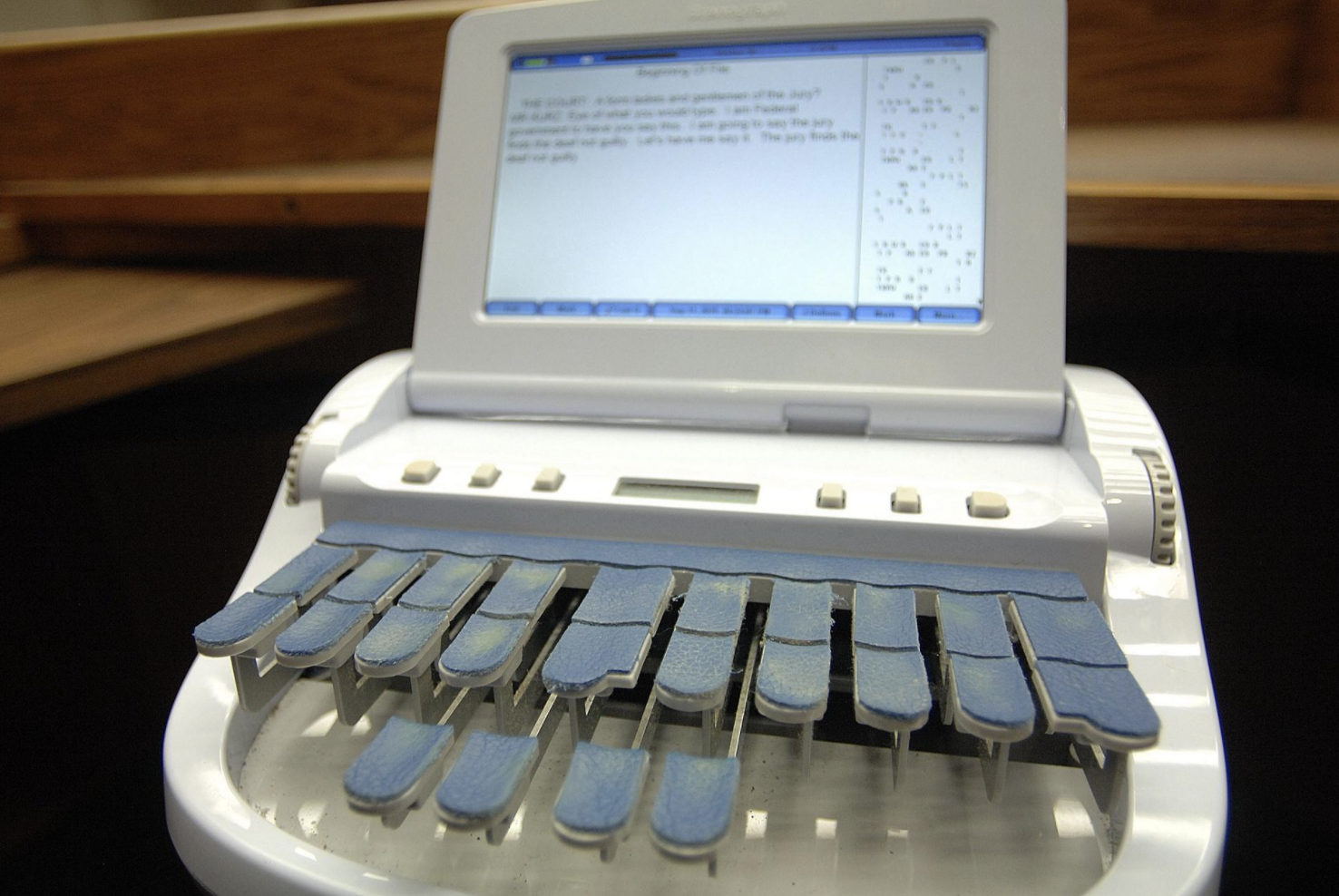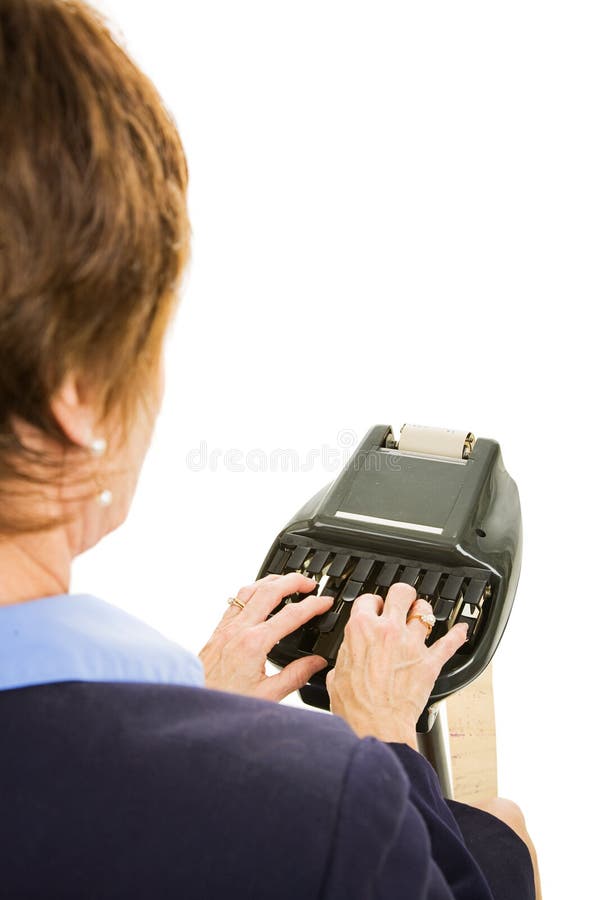Comprehending the Function of a Court Typist: Secret Duties and Job Path Insights
As a court typist, you play an essential duty in the judicial system, ensuring that every word spoken in court is accurately caught. Your responsibilities surpass just keying; they involve managing delicate records and keeping stringent privacy. Understanding your obligations is essential to steering through this profession effectively. But what skills and certifications do you really require to excel, and what occupation courses can you go after? Let's check out.
Summary of the Court Typist Duty
A court typist plays a vital function in the lawful system, guaranteeing that all talked proceedings are accurately recorded. You're the one who catches the subtleties of court room dialogue, converting spoken exchanges right into created records - court typist. This isn't just concerning keying; it has to do with understanding the complexities of lawful language and treatments. You often function under pressure, needing to keep emphasis while deadlines loom.Your interest to detail is vital, as even the tiniest mistake can have considerable implications. You must also recognize with the innovation made use of in courts, from dictation devices to transcription software.Moreover, you're part of a bigger group, working together very closely with courts, legal representatives, and various other court officials. Your job adds to the openness and integrity of the judicial process. Recognizing your role assists you value the effect you carry guaranteeing justice is offered through precise paperwork
Trick Duties of a Court Typist
While you could assume the function of a court typist is exclusively regarding keying, it incorporates an array of crucial duties that assure the lawful procedure runs efficiently. You'll be accountable for transcribing tests, hearings, and depositions precisely, making sure every information is captured. You'll likewise assess and proofread records for errors, preserving a high level of precision and clarity.In addition to transcription, you'll arrange and file legal papers, making them easily obtainable for judges and lawyers. You may require to help in preparing instance documents and upgrading records as called for. Efficient communication is vital, as you'll commonly collaborate with lawful personnel to clarify info or gather necessary details.Your duty additionally consists of taking care of deadlines, so prompt conclusion of files is important. By satisfying these duties, you play a key component in guaranteeing and supporting the judicial system that lawful process are documented properly.
Necessary Skills for Court Typists
Successful court typists possess an one-of-a-kind collection of abilities that boost their capability to perform properly in a fast-paced legal setting. Strong typing skills are necessary; you'll need to kind quickly and accurately to maintain up with court procedures. Interest to detail is vital, as also minor errors can have significant consequences.You should also have a strong understanding of lawful terms, which allows you to precisely transcribe papers and preserve clarity. Excellent organizational skills are important for managing several cases and making sure deadlines are met.Moreover, good interaction skills help you engage properly with judges, attorneys, and other court workers. Adaptability is key; you'll typically encounter unexpected scenarios that call for quick thinking and analytic. By developing these important abilities, you'll position yourself for success as a court typist in the lawful area.
Educational Accreditations and Training

To become a successful court typist, you'll require a solid academic history, frequently including a senior high school diploma or equivalent. Appropriate keying certifications can enhance your credentials and enhance your job leads. Furthermore, on-the-job training possibilities can help you obtain the practical abilities required for this function.
Crucial Educational Background

Relevant Entering Certifications
While having a strong instructional structure is necessary, acquiring pertinent inputting certifications can significantly enhance your certifications as a court typist. Accreditations like the Licensed Expert Secretary (CPS) or the Registered Expert Assistant (RPS) demonstrate your efficiency and commitment to the occupation. These credentials not only validate your inputting speed and accuracy but additionally display your understanding of legal terminology and document formatting crucial in court settings. In addition, seeking specialized training courses in legal transcription can better refine your abilities, making you a more affordable prospect. By purchasing these qualifications, you reveal possible companies your commitment to excellence and your readiness to deal with the needs of a court typist role properly. This aggressive strategy can greatly boost your profession leads.
On-the-Job Training Opportunities
As you begin your journey to become a court typist, on-the-job training provides invaluable experience that complements your formal education. You'll likely start in a helpful function, trailing seasoned typists and finding out the ropes of court treatments, terms, and software. This hands-on experience helps you establish necessary skills, such as accurate transcription and time management.Many courts supply structured training programs that allow you to practice under real problems, boosting your self-confidence and performance. You'll likewise get knowledgeable about various legal files and court room protocols, offering you a benefit in your profession. Embrace these possibilities, as they'll not just fine-tune your keying abilities but additionally develop your expert network within the lawful area, setting you up for future success.
Occupation Path and Improvement Opportunities
Court typists usually locate themselves on a promising occupation path with different development possibilities. As you acquire experience and improve your skills, you might relocate right into roles like lead typist or manager, overseeing a group of typists. With additional training, you can focus on legal transcription or court reporting, which commonly uses higher incomes and higher responsibilities.You could likewise think about seeking qualifications that can set you besides the competitors. Connecting with legal specialists can open up doors to advanced positions, such as administrative duties in law office or notary positions.As you remain to construct your expertise in lawful terminology and technology, opportunities in associated fields like legal assistant work or lawful support might likewise occur. By being aggressive and looking for added training, you can significantly expand your occupation options and possibly move into higher-level lawful duties.
The Relevance of Accuracy in Legal Transcription
Accuracy in lawful transcription is vital because even a tiny mistake can alter the definition of a paper. When you're transcribing, your accuracy straight impacts court proceedings and can influence the results of situations. By utilizing the right tools, you can enhance your precision and warranty that every information is recorded appropriately.
Precision in Legal Papers
When you consider the lawful system, the accuracy of papers often makes the difference between a situation won or shed. As a court typist, you are in charge of recording legal proceedings with absolute accuracy. Every word, punctuation mark, and formatting information issues. A solitary error can cause misconceptions, misinterpretations, or perhaps jeopardize a client's instance. You need to remain concentrated, listen diligently, and have a comprehensive understanding of lawful terminology. Furthermore, preserving discretion is crucial, as you deal with delicate information. Your role isn't nearly typing; it's great post to read about guaranteeing the honesty of legal documents. By developing your skills and prioritizing precision, you contribute substantially to the effectiveness of the lawful system and the search of justice.
Impact on Court Procedures
The success of court proceedings hinges on the precision of legal transcription. Every word matters when you record court hearings. A single error can cause misconceptions, affecting the end result of situations. If you misinterpret a critical declaration or misspell a crucial term, it can alter the whole context of the dialogue. Juries, attorneys, and courts depend on your work to make informed choices based on the proof offered. Your focus to detail guarantees that the authorities document mirrors the true procedures, offering clearness and accountability. By preserving high standards in your transcription, you add considerably to the honesty of the lawful process. Eventually, your duty is crucial in upholding justice and ensuring that every voice is properly represented in court
Tools for Accurate Transcription
To toenail exact transcription in the courtroom, you require the right devices within your reaches. A high-quality transcription software can considerably enhance your performance, permitting you to record every word specifically. Invest in a trustworthy headset to filter out history sound and assurance quality in audio recordings. A foot pedal can additionally quicken your process, allowing you control playback go to these guys hands-free. Furthermore, keeping a considerable legal thesaurus or reference helps you swiftly reference terminology, making certain you do not miss essential details. It's crucial to have a comfortable, ergonomic workstation to lessen diversions and fatigue during lengthy sessions. By furnishing on your own with these crucial tools, you'll boost your accuracy and add effectively to the legal process.
Job Atmosphere and Work Outlook for Court Typists
Court typists grow in vibrant atmospheres, commonly located within legal workplaces or bustling court houses. You'll discover on your own surrounded by lawful experts, from legal representatives to judges, all collaborating to ensure justice is offered (court typist). Your work space might be hectic, requiring you to adjust swiftly to differing demands, whether it's transcribing court process or preparing lawful documents.As for the work overview, the demand for court typists continues to be stable because of the ongoing need for precise paperwork in lawful setups. While technology has actually automated some transcription tasks, proficient court typists who can manage complex legal terminology and keep precision are still highly valued. Numerous typists additionally have opportunities for innovation within the lawful field, progressing into duties such as legal secretaries or management that site assistants. Your interest to detail and capacity to work under pressure will be crucial for your success in this substantial function
Frequently Asked Inquiries
What Equipment or Software Do Court Typists Commonly Make Use Of?
Court typists commonly utilize transcription software program, word cpus like Microsoft Word, and specialized court coverage tools. You'll also rely upon foot pedals and premium headsets to boost precision and performance in your transcription tasks.
How Does One Find Task Openings for Court Typists?
To discover task openings for court typists, check on the internet task boards, legal web sites, and court system occupation web pages. Connecting with specialists in the field can likewise cause unadvertised possibilities you may not discover otherwise.

What Is the Typical Wage for a Court Typist?
The typical salary for a court typist varies by area and experience, but you can anticipate it to vary from $35,000 to $55,000 each year. Study regional task listings to obtain a better feeling of salaries.
Exist Certifications Available for Court Typists?
Yes, there are qualifications offered for court typists. You can seek professional courses that enhance your skills, like lawful transcription or court reporting qualifications, which can increase your job chances and reputation in the field.
Can Court Typists Work Remotely or Freelance?
Yes, court typists can work remotely or freelance, specifically with developments in modern technology. You'll find chances in transcription services or lawful firms that permit versatile work arrangements, adapting to your schedule and preferences. As a court typist, you play a crucial duty in the judicial system, making sure that every word talked in court is accurately recorded. Networking with legal professionals can open doors to a lot more innovative placements, such as administrative duties in legislation firms or court clerk positions.As you proceed to construct your competence in lawful terminology and innovation, opportunities in associated areas like legal assistant work or lawful support may also develop. Your work area may be fast-paced, requiring you to adapt swiftly to differing demands, whether it's transcribing court process or preparing legal documents.As for the job expectation, the need for court typists stays consistent due to the ongoing requirement for exact paperwork in legal settings. Court typists typically make use of transcription software application, word cpus like Microsoft Word, and specialized court coverage tools. To find job openings for court typists, check on-line work boards, legal websites, and court system profession web pages.